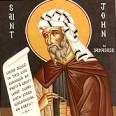by St. John of Damascus
 Our venerable and God-bearing Father John of Damascus (c. 676 – December 5, 749) was also known as John Damascene, Chrysorrhoas, “streaming with gold,” (i.e., the golden speaker). He was born and raised in Damascus, in all probability at the Monastery of Saint Sabbas (Mar Saba), South East of Jerusalem. His feast day in the Orthodox Church is December 4.
Our venerable and God-bearing Father John of Damascus (c. 676 – December 5, 749) was also known as John Damascene, Chrysorrhoas, “streaming with gold,” (i.e., the golden speaker). He was born and raised in Damascus, in all probability at the Monastery of Saint Sabbas (Mar Saba), South East of Jerusalem. His feast day in the Orthodox Church is December 4.
We declare that the addition which the vain-minded Peter the Fuller made to the Trisagion (Thrice-Holy) Hymn is blasphemous; for it introduces a fourth person to the Trinity, giving a separate place to the Son of God, Who is the truly subsisting power of the Father, and a separate place to Him Who was crucified as though He were different from the “Mighty One,” or as though the Holy Trinity was considered passible, and the Father and the Holy Spirit suffered on the Cross along with the Son.
Have done with this blasphemous and nonsensical interpolation! For we hold the words “Holy God” to refer to the Father, without limiting the title of divinity to Him alone, but acknowledging also as God the Son and the Holy Spirit: and the words “Holy Mighty” we ascribe to the Son, without stripping the Father and the Holy Spirit of might: and the words “Holy Immortal” we attribute to the Holy Spirit, without depriving the Father and the Son of immortality. For, indeed, we apply all the divine names simply and unconditionally to each of the subsistences in imitation of the divine Apostle’s words:
“But to us there is but one God, the Father, of Whom are all things, and we in Him: and one Lord Jesus Christ by Whom are all things, and we by Him.”
And, nevertheless, we follow Gregory the Theologian when he says, “But to us there is but one God, the Father, of Whom are all things, and one Lord Jesus Christ, through Whom are all things, and one Holy Spirit, in Whom are all things:” for the words “of Whom” and “through Whom” and “in Whom” do not divide the natures (for neither the prepositions nor the order of the names could ever be changed), but they characterize the properties of one unconfused nature. And this becomes clear from the fact that they are once more gathered into one, if only one reads with care these words of the same Apostle, “Of Him and through Him and in Him are all things: to Him be the glory for ever and ever. Amen.”
For that the Trisagion refers not to the Son alone, but to the Holy Trinity, the divine and saintly Athanasios and Basil and Gregory, and all the band of the divinely-inspired Fathers bear witness: because, as a matter of fact, by the threefold holiness the Holy Seraphim suggest to us the three subsistences of the superessential Godhead. But by the Lordship they denote the one essence and dominion of the supremely-divine Trinity. Gregory the Theologian of a truth says,
“Thus, then, the Holy of Holies, which is completely veiled by the Seraphim, and is glorified with three consecrations, meet together in one lordhship and one divinity.”
This was the most beautiful and sublime philosophy of still another of our predecessors.
Ecclesiastical historians, then, say that once when the people of Constantinople were offering prayers to God to avert a threatened calamity, during Proclus’ tenure of the office of Archbishop, it happened that a boy was snatched up from among the people, and was taught by angelic teachers the Thrice-Holy Hymn, “
Thou Holy God, Holy Mighty One, Holy Immortal One, have mercy upon us:”
and when once more he was restored to earth, he told what he had learned, and all the people sang the Hymn, and so the threatened calamity was averted. And in the fourth holy and great Ecumenical Council, I mean the one at Chalcedon, we are told that it was in this form that the Hymn was sung; for the minutes of this holy assembly so record it. It is, therefore, a matter for laughter and ridicule that this Thrice-Holy Hymn, taught us by the angels, and confirmed by the averting of calamity, ratified and established by so great an assembly of the Holy Fathers, and sung first by the Seraphim as a declaration of the three subsistences of the Godhead, should be mangled and forsooth emended to suit the view of the stupid Fuller as though he were higher than the Seraphim. But oh! the arrogance! not to say folly! But we say it thus, though demons should rend us in pieces,
“Do Thou, Holy God, Holy Mighty One, Holy Immortal One, have mercy upon us.”
St. John of Damascus Exposistion of the Orthodox Faith Book 3, Chapter 10
